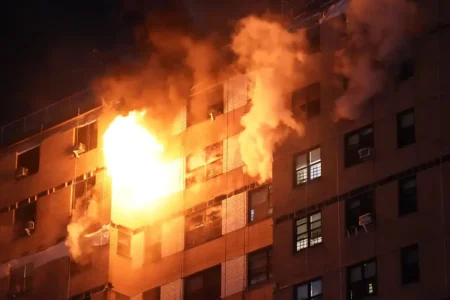Ukrainian Anti-Corruption Agencies Reveal Major Nuclear Energy Scandal Despite Presidential Pressure
Vindication for Watchdogs: Major Investigation Succeeds Despite Political Headwinds
In a dramatic turn of events that underscores the resilience of Ukraine’s anti-corruption infrastructure, investigative agencies have uncovered what they describe as a significant corruption scheme involving the country’s state-owned nuclear energy company. This breakthrough comes just months after President Volodymyr Zelensky attempted to curtail the powers of these very same watchdog organizations, raising questions about the delicate balance between executive authority and independent oversight in a nation still developing its democratic institutions.
The investigation, spearheaded by Ukraine’s National Anti-Corruption Bureau (NABU) and the Specialized Anti-Corruption Prosecutor’s Office (SAPO), has revealed an elaborate network of financial improprieties within Energoatom, the state enterprise responsible for operating Ukraine’s four nuclear power plants. According to preliminary findings released at a press conference in Kyiv yesterday, officials allegedly diverted millions of dollars through inflated contracts, phantom suppliers, and offshore accounts. “This case represents one of the most complex corruption schemes we have uncovered since our inception,” said Semen Kryvonos, the recently appointed head of NABU. “It touches on national security concerns given the strategic importance of Ukraine’s nuclear infrastructure, particularly during wartime.”
The timing of this revelation carries particular significance given the political context. Last autumn, President Zelensky initiated a controversial campaign to restructure Ukraine’s anti-corruption bodies, citing the need for greater efficiency and alignment with European standards as Ukraine pursues its EU membership aspirations. Critics, however, characterized these moves as an attempt to consolidate presidential control over institutions specifically designed to operate independently. International partners, including the European Union and the United States, expressed concern that these reforms might undermine Ukraine’s progress in combating corruption – a long-standing condition for continued financial and military support during the ongoing conflict with Russia. The European Commission even temporarily froze certain assistance programs pending clarification of the government’s intentions regarding anti-corruption efforts.
The Investigation: Following the Money Through Complex Networks
The investigation into Energoatom began quietly in late 2022, according to prosecutors, when financial analysts identified unusual patterns in procurement contracts related to equipment maintenance and uranium fuel purchases. What initially appeared as minor accounting irregularities eventually revealed a sophisticated scheme allegedly orchestrated by senior executives working in concert with private vendors. Documents obtained by investigators suggest that contracts were systematically inflated by 15-30% above market rates, with the difference channeled through a labyrinth of shell companies registered in Cyprus, Latvia, and the United Arab Emirates before reaching personal accounts controlled by the scheme’s participants.
Particularly troubling are allegations that some of the diverted funds were used to finance luxury real estate purchases in Western Europe at a time when Ukraine’s energy infrastructure was under relentless Russian missile attacks. “While ordinary Ukrainians endured blackouts and energy rationing, these individuals were securing multi-million euro properties on the French Riviera,” said Oleksandr Klymenko, the chief anti-corruption prosecutor, displaying property records and bank transfers on a digital screen. The investigation has already resulted in seven arrests, including two former deputy directors at Energoatom and several private businesspeople. Authorities have frozen assets worth approximately €28 million ($30.5 million) across multiple jurisdictions with assistance from international partners through Eurojust, the European Union’s judicial cooperation unit.
Technical aspects of the scheme allegedly exploited Ukraine’s wartime emergency procurement procedures, which were implemented to expedite critical purchases for the energy sector following Russian attacks on infrastructure. While these emergency measures were necessary to maintain energy security, investigators claim they were abused to bypass traditional oversight mechanisms. Forensic accountants working with NABU have documented at least 17 separate contracts where specifications were manipulated to favor particular suppliers who had pre-existing relationships with Energoatom management. In one particularly egregious example, replacement parts for cooling systems were purchased at six times their standard market value through a recently established intermediary company with no previous experience in the nuclear industry.
Institutional Resilience: Anti-Corruption Bodies Push Back Against Constraints
The successful progress of this high-profile investigation represents a remarkable institutional recovery for Ukraine’s anti-corruption agencies. When President Zelensky moved to restructure these bodies last October, many observers feared it would fatally undermine their operational independence. The presidential administration had cited inefficiencies and overlapping jurisdictions as justification for the proposed changes, which would have placed greater executive control over hiring and firing decisions for key anti-corruption positions. International financial institutions, including the International Monetary Fund, which has provided crucial economic support to Ukraine during the war, expressed concern that such changes could violate conditions attached to financial assistance packages.
Following intensive diplomatic engagement and domestic civic pressure, a compromise was eventually reached that preserved the core independence of the anti-corruption bodies while implementing more modest procedural reforms. “What we’re seeing now is evidence that the system works when given the space to operate as designed,” said Andrii Borovyk, executive director of Transparency International Ukraine. “This investigation demonstrates why institutional independence matters. It’s doubtful such a case involving strategic state enterprises could proceed under a model with greater political control.” The investigation has also benefited from strengthened whistleblower protections enacted in early 2023, with prosecutors acknowledging that initial evidence came from insiders at Energoatom who provided documentation through secure channels established under the new legislation.
Opposition politicians have seized on the scandal as evidence of broader governance failures, with former parliamentary chairman Dmytro Razumkov calling it “just the tip of the iceberg in a system where state enterprises have become personal fiefdoms.” Government representatives have countered by pointing to the investigation itself as proof of Ukraine’s commitment to rooting out corruption, regardless of where it appears. Prime Minister Denys Shmyhal, speaking at an infrastructure development conference in Warsaw, emphasized that “no one is above the law in modern Ukraine, and this administration fully supports the anti-corruption bodies in their mission, even when investigations lead to uncomfortable places.”
Implications for Energy Security and International Support
The revelations come at a particularly sensitive time for Ukraine’s energy sector, which continues to operate under extreme duress due to Russian targeting of civilian infrastructure. Nuclear power accounts for over half of Ukraine’s electricity generation, making Energoatom’s operations critically important to national resilience. Energy Minister German Galushchenko has assured the public that the investigation will not disrupt power generation or nuclear safety protocols, with interim management already appointed to replace suspended executives. “Operational continuity and safety remain our absolute priorities,” Galushchenko stated during an emergency briefing. “We are cooperating fully with investigators while ensuring that Ukraine’s energy security is not compromised in any way.”
International donors and partners have cautiously welcomed the investigation as evidence of Ukraine’s continued commitment to transparency despite wartime pressures. The United States Ambassador to Ukraine, Bridget Brink, characterized the case as “a difficult but necessary step in Ukraine’s anti-corruption journey” in comments to journalists following a scheduled meeting with judicial officials. European Union Ambassador Katarina Mathernova similarly noted that “fighting corruption while defending against military aggression demonstrates Ukraine’s determination to build a European future based on rule of law principles.” The case may actually strengthen Ukraine’s position in ongoing accession talks with the European Union, where anti-corruption measures feature prominently among the required reforms.
For ordinary Ukrainians, who consistently rank corruption among their top concerns even amid the existential threat of Russian invasion, the case represents a bittersweet vindication. “We always suspected such schemes existed, but seeing action taken gives some hope that things might actually change,” said Olena Petrenko, an energy sector engineer interviewed at Kyiv’s Independence Square. “If we can hold people accountable during wartime, there should be no excuses during peace.” As the investigation proceeds toward what prosecutors estimate will be Ukraine’s largest corruption trial in a decade, it stands as a powerful reminder that the struggle for Ukraine’s future is being fought not only on the battlefield but in the less visible but equally crucial arenas of governance, transparency, and rule of law.










